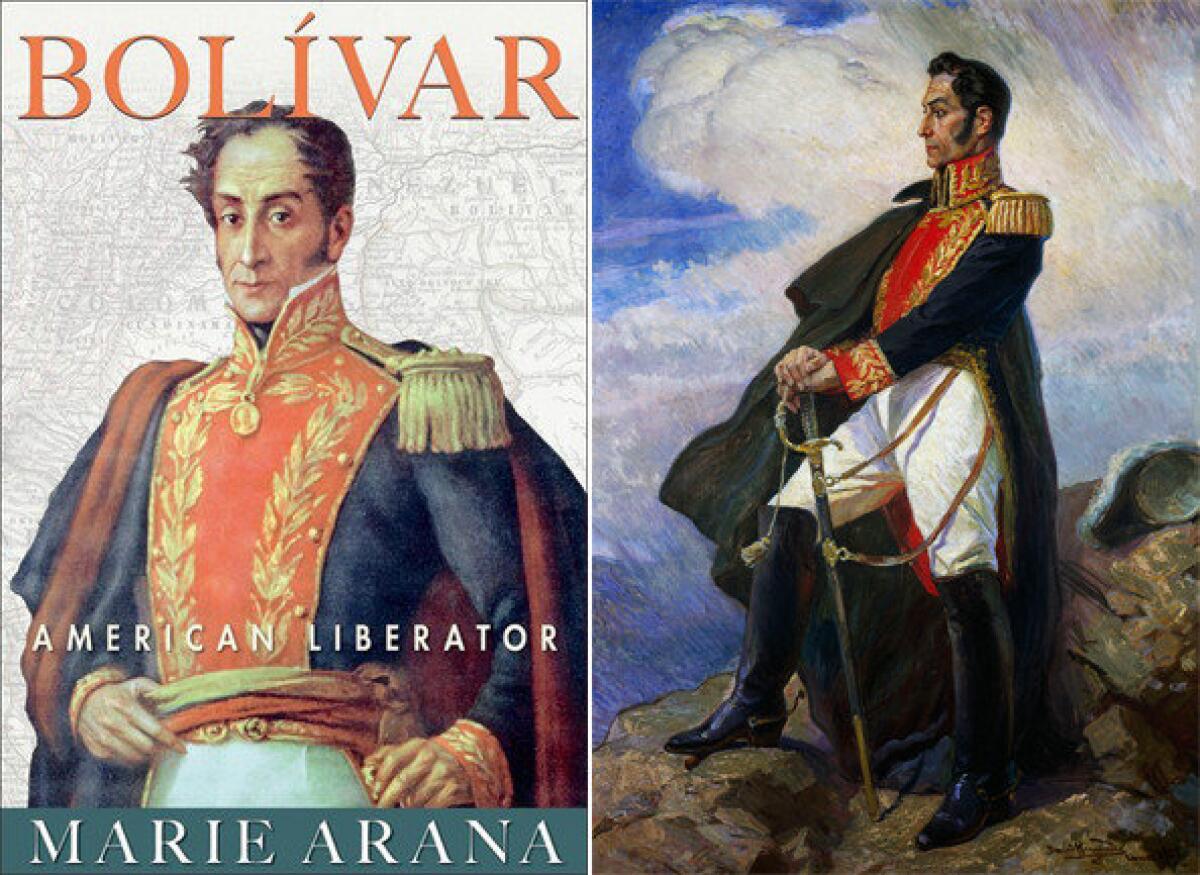The epic life of SĂmon BolĂvar

Deep into Marie Aranaâs wonderful new biography of SimĂłn BolĂvar, âthe George Washington of South America,â thereâs a deliciously unexpected pause in the action.
Itâs 1816, and BolĂvar has set sail from Haiti. Heâs on his way back to Venezuela, with an army set to take on the hated Spanish colonial authorities.
At the island of St. Thomas, he ostensibly stops for âsupplies.â In reality, his fleet of ships has anchored so that BolĂvar can pick up his mistress, Pepita Machado. The advent of text messaging is two centuries away, however, and the lovers have their signals crossed â Machado has sailed for Haiti. For three days, the fleet waits, and when a ship finally retrieves Machado, the flotilla waits one more day while she and BolĂvar make love.
âBolĂvar now maddened his officers with his unquenchable libido,â Arana writes. It was, she adds, a âbad startâ to a year of warfare that would see BolĂvar proclaim, for the third time, the dawn of a new republic in Venezuela â and fail for the third time to win its war of independence.
In âBolĂvar: American Liberator,â BolĂvar emerges as a complex and confounding human being. He was the essential figure in the revolutionary wars that created five South American countries. Brilliant and erudite, he was an idealist and also a ruthless military leader as well as a deeply charismatic a man of letters.
His speeches and correspondence, Arana writes, ârepresent some of the greatest writing in Latin America lettersâ and âchanged the Spanish language.â He began his political career as a fervent believer in personal freedom and self-rule.
Still, he committed the kinds of atrocities that today would be called war crimes. And he eventually concluded that Latin America was not ready for true democracy.
In Aranaâs energetic and highly readable telling, BolĂvar comes alive as having willed himself an epic life. As a young man on a visit to the royal court in Madrid, he once played badminton with the future king he would later work feverishly to undermine. As a general, he covered more miles and crossed more mountain ranges, swamps and deserts than Hannibal, Julius Caesar and Alexander the Great â but he spent his final years in obscure poverty.
âFew heroes in history have been dealt so much honor, so much power â and so much ingratitude,â Arana writes.
Arana, former editor of the Washington Post Book World, is the author of four books, including two novels and the memoir âAmerican Chica,â which was a finalist for the National Book Award. She brings great verve and literary flair to her biography of BolĂvar.
BolĂvar was born into one of South Americaâs wealthiest families. But he was also orphaned at a young age and briefly ran away from his court-appointed guardian to live among the street urchins and ruffians of Caracas.
To his good fortune, the young BolĂvar found some outstanding teachers in Caracas, including Simon Rodriguez, a follower of Rousseau, Locke and Voltaire. As he grew into adulthood, BolĂvar traveled widely. Aranaâs account of his journey through 19th century America and Europe is reminiscent of Ernesto âCheâ Guevaraâs famous motorcycle wanderings in the 20th century.
In Paris, BolĂvar catches a glimpse of Napoleon, socializes with the grand dame Fanny du Villars, and meets the legendary naturalist Alexander von Humboldt, personalities Arana vividly brings to life. He hikes the Alps, following the footsteps of Rousseau. In Rome, he meets Pope Pius VII but refuses to kneel and kiss the pontiffâs sandal.
Later, he climbs one of Romeâs hills and looks down at the ruins of the ancient city with his old teacher Rodriguez. BolĂvar ponders the failure of the Roman republic and thinks about Latin Americaâs servitude to Spain.
âSuddenly, eyes bright with emotion, he ⌠sank to his knees,â Arana writes. At that moment, the 22-year-old BolĂvar âswore by the God of his fathers that he would liberate his country. âI will not rest until I have rid it of every one of those bastards!ââ
BolĂvar was only 30 when, in 1813, he first led rebel troops into Caracas, a city he would conquer and lose to the royalists several times during a 14-year war of independence.
Aranaâs book is no hagiography. Her BolĂvar is undoubtedly brilliant and courageous but also capable of great cruelty. She details the horrors of his early âwar to the deathâ against the Spanish royalists, which quickly devolved into a kind of race war, in which thousands of civilians were executed by both sides.
âSpaniards were being dragged to the dungeons, made to surrender their wealth to patriot coffers,â Arana writes. âThe unwilling were taken to the marketplace and shot.â
The revolutionary wars unfolded as an often dizzying litany of shifting alliances and bloody battles, but Arana describes them all with an eye to the cinematic, her scenes filled with one well-crafted character study after another.
Eventually, BolĂvarâs fair-skinned, Creole-led rebels were forced to embrace the cause of blacks and mixed-race people to win their war against the crown. The regionâs slaves won emancipation a half century before their counterparts in the U.S.
In the end, BolĂvarâs early Latin American democracies failed, primarily, because of the legacy of colonial Spain. To fill royal coffers and keep their colonies weak, the Spanish crown prohibited both printing presses and most industry in Latin America. Unlike the New Englanders who created a nation in North America, Spainâs colonies had no experience of local self-rule.
âIn his darkest hours, BolĂvar wondered whether his America was truly ready for democracy,â Arana writes. His vision of continental unity, of a confederation of Latin American states, fell apart amid the regional conflicts and the power of local caudillos. And in peace, BolĂvar badly blundered as a ruler.
âBut for all his flaws,â Arana concludes, âthere was never any doubt about his power to convince, his splendid rhetoric, his impulse to generosity, his deeply held principles of liberty and justice.â
[email protected]
BolĂvar
American Liberator
Marie Arana
Simon & Schuster: 604 pp., $35
More to Read
Sign up for our Book Club newsletter
Get the latest news, events and more from the Los Angeles Times Book Club, and help us get L.A. reading and talking.
You may occasionally receive promotional content from the Los Angeles Times.








